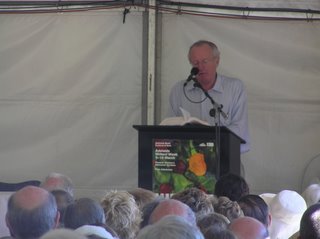 This week I've been very fortunate to hear two different but complementary presentations by Robert Fisk at Writers Week.
This week I've been very fortunate to hear two different but complementary presentations by Robert Fisk at Writers Week.On Wednesday the fire in his belly was evident as he spoke of his experiences spanning almost 30 years as a journalist covering the Middle East. On Thursday his tone was more reflective as he read from his book The Great War for Civilisation, beginning with a piece about his father from chapter 9. What seems at first to be an island of personal reflection in an ocean of political analysis soon brings the two together into one theme: the roots of the current Middle East troubles extend back to the "great war for civilisation", aka World War 1. The spine of the bulky (see photo) and sometimes labyrinthine book depicts those words on the back of one of his father's medals.
I was most taken by RF's "equation" ,as he described it in one of his presentations, about the US presence in Iraq. It's mathematically incorrect but has a kind of doublespeak logic to it:
- The US should not have gone into Iraq
- The US must get out
- The US can't get out.
The questions for the Thursday presentation were generally much more focused than those for the Wednesday one. The Thursday presenter, Roy Eccleston of The Australian, set the ball rolling by asking whether RF ever had nightmares about some of the gruesome scenes he'd witnessed (the answer was only once). Other questions asked whether RF thought he'd been in the job too long to retain a reasonably balanced albeit pro-Palestinian perspective (he didn't), and whether his pessismistic vision allowed any scope for hope that things might somehow become less bloody (only subject to some unlikely but not impossible conditions being met).
Update Friday 10 March
Today's Canberra Times reports on a public lecture RF delivered last night on the topic

No comments:
Post a Comment